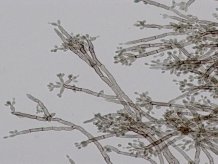Articles
Articles

Phase contrast light micrograph of Fonsecaea pedrosoi (credit Professor Gordon Brown)
Five-year funding boost for fungal research centre
A leading fungal research centre has received a further five years' funding from the Medical Research Council (MRC).
The MRC Centre for Medical Mycology, based at the University of Exeter, secured the funding through the renewal of its status as an MRC Centre.
The MRC grant, with significant matched funding from the University of Exeter, will enable the Centre to continue working to address the key challenges of fungal diseases worldwide.
The award includes two new posts that will provide expertise to strengthen work on antifungal drug resistance and the consequences of co-infections.
Professor Gordon Brown, Director of the MRC Centre for Medical Mycology, said: “I am thrilled that our MRC Centre has been renewed for another five years.
"The renewal of the Centre highlights the considerable need for more research and training if we are to overcome the huge burden of fungal infectious diseases on human health.
"Centre funding enables our investigators to work cohesively, facilitating cutting-edge, cross-disciplinary research and training that will have global impact."
Professor Lisa Roberts, Vice-Chancellor of the University of Exeter, added: "We are absolutely delighted with this outcome, which is a major achievement for everyone involved in the MRC Centre here at Exeter.
"I am very proud of the whole team and this new award recognises the quality and importance of their work into the growing threat of fungal diseases."
Dr Carolyn Johnson, Programme Manager for Bacteriology and Mycology at the MRC, said: “More than 1.5 million deaths worldwide each year are caused by fungal disease and these infections are an increasingly important challenge to human health, especially given their emerging resistance to antifungal drugs.
"The Medical Research Council Centre for Medical Mycology at the University of Exeter is an internationally recognised strategic Centre of excellence, conducting innovative research into human fungal diseases, and training the next generation of fungal disease experts, building critical mass to tackle this increasingly important health threat.”
A critical gap in the strategy to tackle deadly fungal infection is a lack of capacity in medical mycology.
The MRC Centre will address this gap by continuing to train and mentor junior staff, fellows, clinicians and students.
Early career fellowships and a doctoral training programme, including three clinical PhD fellowships, will provide pivotal training instruments, facilitating cross-disciplinary research activities at the Centre, and partnerships with other institutions nationally and internationally.
Low- and middle-income regions of the world suffer the highest burden of fungal disease, and there is very limited medical mycology expertise in these countries.
To meet this challenge, the Centre will strengthen and grow its network of global satellites: opening new units in Brazil and South East Asia, replicating a highly successful model established through the AFRICA Unit in partnership with University of Cape Town’s Institute of Infectious Disease and Molecular Medicine, in South Africa.
International units will facilitate research tackling fungal diseases endemic to those geographic regions, and to promote training and building capacity in medical mycology across these continents.
Alongside this research, the Centre will deliver a programme of engagement that will that seek to inspire future medical mycologists and to challenge and change public perceptions of fungal disease.
Date: 1 April 2021
